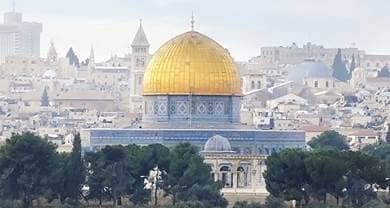- Trending:
- Olympics
- |
- Forgiveness
- |
- Resurrection
- |
- Joy
- |
- Afterlife
- |
- Trump

RELIGION LIBRARY
Islam
Vision for Society
 The ethical duty to command the good and forbid the evil has had the effect of making questions of political order central in the Muslim experience. The Prophet Muhammad himself acted as a lawgiver for the early Muslim community after he emigrated from his hometown of Mecca to the nearby oasis town of Medina to help bring peace after a bloody civil war. In so doing, one of his first acts was to promulgate a written agreement, signed by the various tribal groups inhabiting Medina. A central provision of this agreement was that tribal loyalty could not be used to shield individuals from liability for their breaches of the peace. In the pre-Islamic Arabian context, where tribes felt no obligations to outsiders, the notion that a member of a tribe could be held liable for a wrong committed against an individual from another tribe was a revolutionary concept.
The ethical duty to command the good and forbid the evil has had the effect of making questions of political order central in the Muslim experience. The Prophet Muhammad himself acted as a lawgiver for the early Muslim community after he emigrated from his hometown of Mecca to the nearby oasis town of Medina to help bring peace after a bloody civil war. In so doing, one of his first acts was to promulgate a written agreement, signed by the various tribal groups inhabiting Medina. A central provision of this agreement was that tribal loyalty could not be used to shield individuals from liability for their breaches of the peace. In the pre-Islamic Arabian context, where tribes felt no obligations to outsiders, the notion that a member of a tribe could be held liable for a wrong committed against an individual from another tribe was a revolutionary concept.
Questions of justice, and the relationship of religion to justice, subsequently became an important concern for Muslim theologians, jurists, and philosophers. At first blush, it would appear that the twin commitments to a system of ethics rooted in revelation and to the goal of manifesting that system of ethics in the world could lead to a strictly moral conception of the state. While Islamic history certainly produced instances of such Muslim states, these tended to be exceptions rather than the rule. The reason for this lies both in the nature of internal restraints within the shariah and the practical limitations of pre-modern Muslim states.
| Fundamental norms (daruri) | Secondary norms (ijtihadi) |
| set forth explicitly in revelation | based on scholarly interpretation |
| include religious doctrine (unity of God, accountability before God) |
include most doctrines and ethical obligations |
| also include practical obligations ("Five pillars of Islam," dietary restrictions) |
Because of the role that interpretation played in the articulation of the positive norms of the shariah, substantial disagreement existed as to what the shariah required in any particular instance. The existence of principled disagreement itself served as an important check on the temptation to engage in puritanical politics. Intra-Islamic differences were also compounded by the fact that Muslim societies were generally home to several religions, and while that religious pluralism is not the same as what exists in contemporary liberal multicultural societies such as the United States or Canada, it did mean that Muslim theologians had to consider the extent to which Islamic norms could properly bind non-Muslims. They concluded that only those rules of Islamic law that were not based exclusively on religious adherence could properly bind non-Muslims. For example, non-Muslims could not be held liable for violations of the Islamic proscription against wine-drinking, but they could be held liable for the Islamic proscription against assault.
In addition to the shariah's role in establishing and sustaining a kind of pluralism, pre-modern Islamic states were institutionally weak relative to modern states. As a practical matter, therefore, they lacked the resources to engage in campaigns intended to enforce rigorously the demands of a religiously-inspired code of conduct. Here too, however, the norms of the shariah played an important role in restricting the power of the state to become an intrusive enforcer of morality. The primary shariah value that operated to prevent the rise of moralistic regimes was the commitment to individual privacy; the public—even one that is just according to religious standards—has no right to search for sin in order to suppress it. The state, therefore, had no right to barge into homes looking for illicit activities such as wine drinking. Private spaces were largely immune from state interference, even as public spaces continued to be regulated in conformity with Islamic norms and even though as individuals, Muslims would remain morally accountable to God for their conduct in those spaces that were beyond the reach of the state.
| Muslim Ethical Obligations | |
| Political | power of the state to regulate the conduct of its citizens through law |
| Expressive | obligation of individuals to commend good conduct and condemn evil conduct |
| Moral | obligation of each Muslim to love good and reject evil in their hearts |
Finally, as mentioned above, the paradigm for just interaction in Islamic law was contractual. As a result, this gives Islamic law a rights-respecting sensibility, something that was also important in reducing the power of moralizing political movements. While it would be anachronistic to suggest that pre-modern Islamic law had the same conception of individual rights as the modern liberal state, where it did recognize individuals' rights, those rights were robustly protected. Islamic conceptions of public justice generally had to respect the notion that the means chosen to pursue the "good" had to be consistent with the rights of individuals, particularly their right to some sort of judicial hearing. Government officials, except in cases of relatively minor violations such as deceptive trading practices, could only enforce the law through courts. Likewise, Islamic law also barred the vigilante justice of individuals, recognizing vigilantism itself as a crime.
Study Questions:
1. Why is Islam concerned with justice?
2. How are non-Muslims bound to Islamic norms?
3. How is private life separated from Islamic state control?










